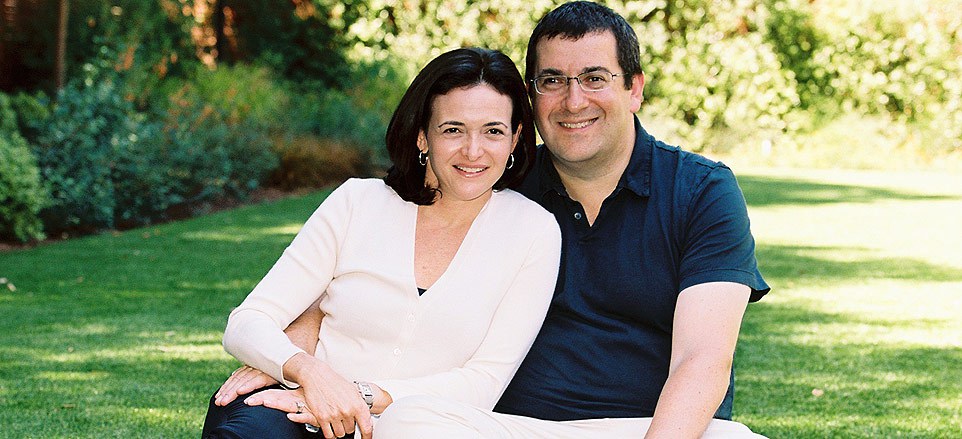
When Sheryl Sandberg’s Lean In debuted, I was in seminary with a newborn baby and an hour and a half commute. People in my life who did not have children at home were telling me to read her book right and left. “Its so insightful!” the empty nesters told me. “Women really can have it all!” well-meaning, but childless people insisted.
Admittedly, I did not buy the book. I saw Sandberg interviewed a handful of times and thought, “I spend most of my nights getting a baby to bed. And then I fall asleep into an account of the Early Church Fathers and my second glass of White Zin.” Unless Sheryl was sending over a nanny and classy wine, I was not going to buy what she was selling.
And then her husband, Dave Goldberg, died. And, shamefully, my first thought was, “She better not write a book about how she’s nailing widowhood because I cannot get with that.” I mean, I prayed for her. I did both of those things.
Sandberg’s Option B: Facing Adversity, Building Resilience and Finding Joy is a cutting and honest account about what life looks like when your spouse dies and your entire life immediately falls apart. She writes about the people who show up and the people who do not. She gives a painful play by play of what it is like to tell elementary-aged children that their father has suddenly died. She writes about the odd expectations we place on widows: expectations to move on or to always be sad.
If you know a widow, buy her the book. But also buy yourself a copy. Because while Sandberg’s insights on her situation make the book totally worth reading, it is her advice for people on the outside looking in that I found most relatable and compelling.
All too often when people die, we have no idea what the “appropriate response” is.
 Many of us get so spooked by the idea of offering the right response that we opt to not say anything at all. Some of us stumble though an apology with our heads tilted just so in order to project the appropriate amount of sympathy. I used to do the cocked head cockamamie thing until a grieving friend told me it was annoying that everyone looked like they had misaligned spines and continuously apologized to her for a death they did not cause. Point taken.
Many of us get so spooked by the idea of offering the right response that we opt to not say anything at all. Some of us stumble though an apology with our heads tilted just so in order to project the appropriate amount of sympathy. I used to do the cocked head cockamamie thing until a grieving friend told me it was annoying that everyone looked like they had misaligned spines and continuously apologized to her for a death they did not cause. Point taken.
My go-to for years has been to say, “Please let me know if there is anything I can do.” As I was reading Option B, I suddenly realized not one soul has taken me up on this offer. A week later, I heard Sandburg interviewed about the book. She explained that my question, no matter how well-meaning, is not actually an offer to help:
I used to say, when someone was going through something hard, “Is there anything I can do?” And I meant it, I meant it kindly. But the problem is … that kind of shifts the burden to the person you’re offering the help to to figure out what they need. And when I was on the other side of that question, I didn’t know how to answer it. Is there anything you can do? Well, can you make Father’s Day go away so I don’t have to live through it every year?
No. Rather than offer to do something, it’s often better to do anything. Just do something specific. My wonderful friends … tragically lost a son and they spent many months in a hospital before that. And one of his friends texted him and said, “What do you not want on a burger?” Not, “Do you want dinner?” Another friend texted and said, “I’m in the lobby of your hospital for an hour for a hug whether you come down or not.” Just show up.
This year I’ll turn 35. I’m entering the age where my friend’s parents are dying and my friend’s spouses could suffer the heart attacks and cancer diagnosises that comes with this era of life. As I was reading Sandberg’s book, I realized I want to be ready to show up for the hard things.
But I also realized I already am.
When I was 14 years old, my very best friend’s dad died in his sleep. He was in his early 40s. It was a tragedy that shook our community. Her father was the kind of guy that oozed dad. He loved giving big hugs, being a St. Louis German Catholic, loved the Cardinals and the Beach Boys, in that order.
When I would visit their house (for what was probably the 3rd time on a Saturday afternoon), he would greet me by singing “Que Sera, Sera” at the door. You know, because I’m Sarah. It was such a solid Dad Joke.
When I was in musical theatre productions he would come to see me perform. Who sits through a terribly amateur production of Man of La Mancha for someone else’s kid? He did. For me.
When he died, it is no exaggeration to say that the entire community showed up at the front door of their house. There were soccer coaches, business friends, and enough teenagers to have a prom. Mostly though, there were just lots and lots of women. An army of suburban mamas showed up and started cleaning the house. It was already, by far, the cleanest house in the neighborhood. But this, I would later learn, is friend funeral protocol. You don’t need to be told what to do. You just haul off and do it.
I now realize that the brigade of people who showed up to help were basically my age right now. They were there to help Sheryl with the death of her husband David. They were there to clean the house and to mind the children. The came to feed everyone, and their brothers, and then some. Mostly, they just showed up to acknowledge that the worst possible thing had happened to their friend.
I only pray that I could be like them.

COMMENTS
5 responses to “Option B: A Primer for When Life Falls Apart”
Leave a Reply














Thank you Sarah–you are wonderful!
Thank you, Sarah! This is one of those things I have always struggled with. A friend told me long ago to just show up.
When my mom was terminal and living with us, I had many people in her church ask me what they could do to help. So I told them. You can pick her up on Sunday, take her to your church, and bring her home. You can drop by for a few hours to babysit our newborn and visit with mom so my wife and I could get a few hours without having to always be on guard. You can bring over dinner on Wednesdays so I can have one day a week when I’m not asked to cook for us. You can simply show up and talk with mom and do nothing but talk with her.
I quickly learned that when people throw out that offer, it’s a reflex and not an offer they ever expect anyone to redeem. Because people backtracked when I thanked then and immediately suggested something they could do for us and for my mom.
How tragic.
Beautifully written, sweet friend!! And so true….losing my mom 4 years ago and our house flooding 3x is a perfect example of your thoughts here. You do remember who offers to help & those who just “show up.” I could rattle off a list of names right now…thanks for sharing!
Being a widow, I can relate. Even so I still find I am not perfect at knowing what to say to the bereaved. I do know, I am much more apt to show up at the funeral, send a card, give soup, sign the visitors log and to keep saying I’m sorry. These things matter.